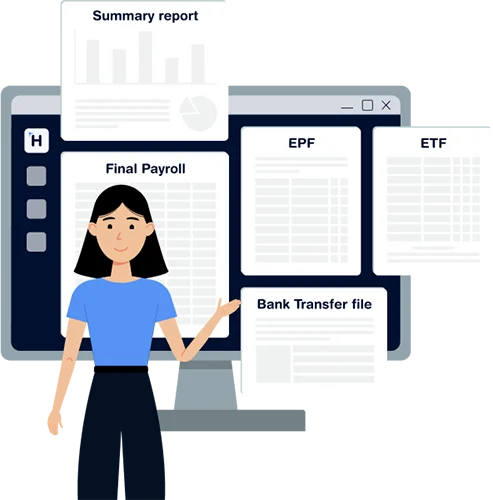We are confident that you have heard what an allowance is and its purpose. Allowances play a pivotal role when calculating small business payroll, so this article provides a thorough understanding of allowances for your payroll.
What are salary allowances?
Salary allowances are any additional benefits of monetary value that the employer offers to the employee in addition to the basic salary. Salary allowances are provided to cover the expenditure incurred by the employee of a particular nature. However, it’s important to note that all employers don’t necessarily offer salary allowances to their employees, as it all depends on the discretion of each company’s policy. Therefore, Company ‘A’ would provide salary allowances to their employees as part of their company policy. In contrast, Company ‘B’ doesn’t offer salary allowances to their employees as it’s not a part of the company policy.
Since we discussed that salary allowances are provided to the employee in addition to their basic salary, we will now look at the difference between the two components.
What’s the difference between basic salary and allowances?
A basic salary is the fixed initial salary of an employee before any additions or deductions are added to it. These additions include allowances, overtime and salary advance etc.
On the other hand, compensation is added when calculating an employee’s gross salary along with the net salary. For example:
Gross salary = net salary + allowances.
What are the different types of allowances generally given by small businesses?
There are different types of allowances which are commonly given to small business employees. Following are the most common allowances given by small businesses:
- Cost of living allowance – This type of allowance depends on the company policy. Most companies provide cost of living allowances for their employees. Still, if the employment contract doesn’t include this clause, the particular company doesn’t offer a cost of living allowance.
- Travel allowance (Conveyance allowance) – This allowance requires an employer to compensate an employee for travelling to work and returning home. A travel allowance is only provided if the employee doesn’t have any means of transport to work.
- Medical allowance – This allowance is provided to employees to look after their medical needs and medical expenses. It is a monthly fixed amount which depends on company policy. This allowance will also be paid on a reimbursement basis where the employee is required to provide proof of medical bills.
- Budgetary Relief Allowance – This allowance is governed under The Budgetary Relief Allowance of Workers Act No. 4 of 2016, which requires employers to pay an amount of Rs. 2500 in two installments for employees earning less than Rs. 40,000. However, if an employee is making more than Rs. 40,000 but doesn’t exceed Rs. 41,500, the allowance to be paid is the difference between the actual amount earned and Rs. 41,500. If an employer breaches this allowance, enforcement action may be taken against the employer.
- Bonus allowance – an extra payment made to the employee during certain festive seasons or based on employee performance.
- Internet allowance – This allowance is mainly provided for work from home employees post the COVID-19 pandemic to compensate for the employee’s WIFI bill incurred for work purposes.
- Mobile allowance – This allowance is provided to an employee to compensate for the cost of phone calls related to work.
It should be noted that although these allowances mentioned above are the most common ones in small businesses, they are nevertheless provided under the discretion of company policy.
How are employee allowances calculated as part of payroll?
As mentioned above, employee allowances are calculated by adding the applicable allowances in the business with other additions along with the basic salary to produce the gross salary earned by the employee.
Are allowances EPF and ETF liable?
Employees must contribute 8% of their total monthly earnings as EPF by deducting it from their salary. Employers are required to contribute an amount equal to 12% of the employee’s total monthly earnings. Cost of living allowance, special living allowance, other similar allowances and food allowance is included when calculating the total monthly earnings for EPF. However, the Bonus allowance is excluded when calculating the total monthly earnings.
In terms of ETF, employers cannot deduct ETF contributions from the employees’ monthly earnings. The employers must calculate 3% of their ETF contributions on the employees’ total monthly earnings. The Cost of Living allowance, special living allowance, other similar allowances and food allowance is included in the employee’s total monthly earnings when the employer’s ETF contributions are calculated.
Now that we have explored that allowances are EPF and ETF liable. We will next consider if allowances are subjected to taxation.
Are allowances taxable or not?
Before the amendments were made to the income tax following the Inland Revenue Act No. 24 of 2017, tax-free allowance (allowance isn’t taxable) for a Sri Lankan resident or a non-resident Sri Lankan citizen was Rs. 500,000 for a year of assessment. A Sri Lankan resident receiving income from employment was granted an additional tax-free allowance up to Rs. 700,000 for a year of assessment. However, after the amendments made under the Inland Revenue Act No. 24 of 2017, tax-free allowance for a resident or a non-resident Sri Lankan citizen is up to Rs. 3,000,000 for a year of assessment, with effect from January 1st 2020.
How can my small business implement better employee benefits, including healthcare allowances?
According to Vantage Circle, 50% of employees will leave their job for better benefits awarded by another business. It’s no doubt that the current situation in the country is affecting your employees and small business at large. It’s hard for employees to cope with the political, mental and work pressures simultaneously. Therefore, your small business must implement better employee benefits to make your employees feel that their emotions and well-being are looked after by their employers and that the business genuinely cares for them.
Here are a few ideas below on how your small business can do so:
- Implement insurance plans – Insurance benefit schemes are a great way to show your employees that you care for them. Such insurance schemes cover losses from accidents, disability, sudden death, medical checkup etc.
- Paid leaves – it’s essential that your employees are provided paid leaves. They deserve paid leave during a vacation by themselves or with their families or when unavoidable circumstances don’t permit them to show up for work.
- Paid sick leave – providing paid sick leave to employees is an excellent way of showing your employees that you care for them when their well-being is not at its best.
- Wellness programs – Most companies carry out wellness programs in this day and age for all their employees to maintain a healthy lifestyle. Wellness programs can be yoga sessions, exercise programs and health screenings.
- Remote working – Remote working is the best way to ensure that your employees don’t constrain themselves to the usual 9-5 working hours and have the flexible option of working at home with much comfort and less stress.
- Healthcare allowance – By implementing a healthcare allowance, the employer can easily cover an employee’s healthcare expenses, thus ensuring that the employee doesn’t have to worry about funding their health needs during this national crisis.
Therefore, by considering what we have explored in this article on the different types of allowances in the Sri Lankan payroll context, we hope you have received a comprehensive understanding of the topic to ensure that you provide allowances and better employee benefits to your staff.
Resources
https://www.icicibank.com/knowledge-base/tax/salary-allowances.page
https://etfb.lk/employers-faq/
https://blog.vantagecircle.com/employee-benefits-compensation-ideas/
https://www.desaram.com/covid-19/recent-changes-to-income-tax.php

